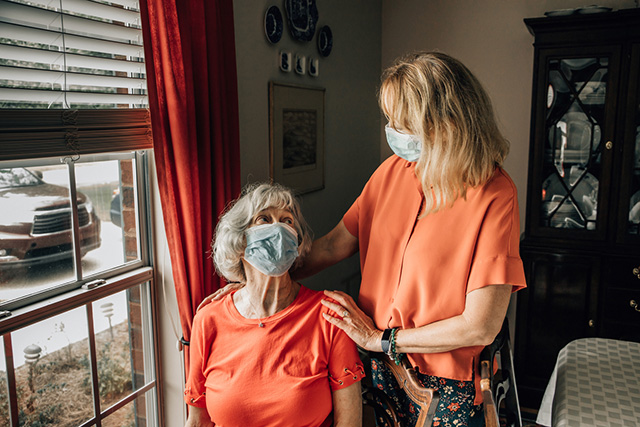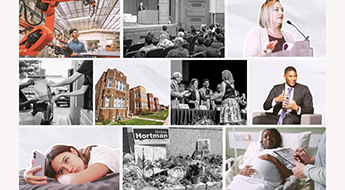Why Do Unvaccinated Americans Wear Masks?
National poll cites their No. 1 reason as concern for protecting their loved ones
Get all our news
For those wearing masks it may require engaging on the science of the vaccine, while the unmasked group may require persuasion on the general personal and public health threat.”
James Druckman
IPR political scientist

While 29% of Americans are still unvaccinated, nearly two-thirds of this group (19%) are concerned enough about the spread of COVID-19 to regularly wear a mask—and the No. 1 reason for a large majority of them is concern about family members contracting COVID-19.
In a recent survey, researchers from Northwestern, Northeastern, Harvard, and Rutgers polled more than 21,000 individuals from all 50 states between Aug. 26 and Sept. 27 on this topic. The researchers find that 62.6 million Americans, or nearly one-fifth of the U.S. population, fall into this unvaccinated, mask-wearing group.
“This suggests there are two distinct populations of unvaccinated,” said IPR political scientist James Druckman, who co-led the survey. “Those wearing masks who are taking the virus very seriously—while the unmasked group appear to be taking the virus less seriously.”
The researchers sought to understand why unvaccinated Americans choose to wear a mask and what keeps them from getting the COVID-19 vaccination.
Who are the unvaccinated mask wearers?
The poll found unvaccinated Americans who choose to wear masks are:
- more likely to be politically Independent (47%) than the entire sample (36%),
- significantly younger, with 63% under the age of 45 versus 47% for all Americans under the age of 45, and
- disproportionately from the South (45%) and less likely to be from the Northeast (14%).
Low trust in institutions, high concern for family
Among the unvaccinated choosing to wear masks, the survey reported the lowest level of trust in the capacity of 22 different institutions and individuals to handle the COVID-19 outbreak. While this group reported the highest level of trust in Donald Trump among surveyed categories, their trust in Trump was marginally lower than trust in hospitals and doctors.
The poll also finds high levels of worry over personally contracting COVID-19 among both vaccinated mask wearers (72%) and unvaccinated mask wearers (62%). And for both, their highest level of concern was for the welfare of their family members in possibly contracting COVID-19 (84% and 75%, respectively).
According to Druckman, the report indicates different communication strategies are needed for those who remain unvaccinated, based on numerous factors, including whether they choose to wear masks.
“For those wearing masks it may require engaging on the science of the vaccine, while the unmasked group may require persuasion on the general personal and public health threat,” Druckman said.
Previous COVID States Survey results can be found here.
James Druckman is the Payson S. Wild Professor of Political Science and IPR associate director and fellow.
Photo Credit: iStock
Published: October 22, 2021.


